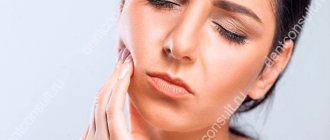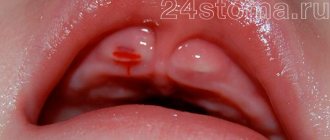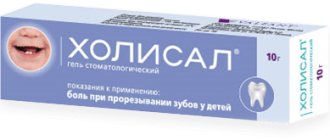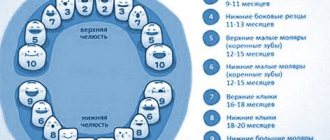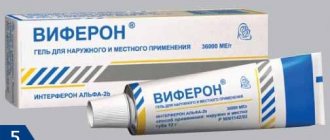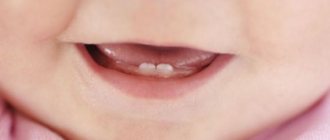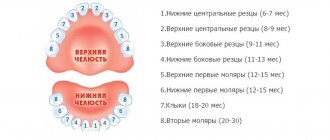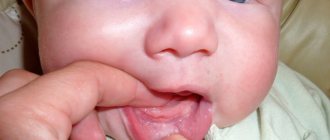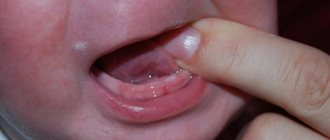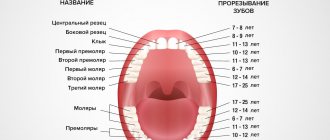The period when babies erupt their first baby teeth is a rather difficult time for parents. But this process also brings a lot of unpleasant sensations to the baby himself. Pain, increased body temperature, profuse salivation - these are only minimal manifestations that accompany the appearance of almost every new tooth. We will try to tell you about what products can be used for gums during teething in children, as well as how you can alleviate discomfort and pain in a child.
All medications that are used to alleviate unpleasant symptoms during teething are divided into the following groups:
- topical preparations (ointments, gels, creams);
- painkillers and anti-inflammatory drugs in the form of drops for oral use;
- homeopathic medicines.
How do these medications work for teething?
The action of gels and ointments with an analgesic effect is based on the presence in their composition of an anesthetic substance (for example, lidocaine or another) that blocks pain receptors that are located on the surface of the gums. They may additionally contain plant extracts and anti-inflammatory components that help eliminate inflammatory manifestations that occur during teething.
Almost immediately after their application, the effect occurs, but the effect of such a medicine is insignificant, most often no more than half an hour.
An indication for the use of painkillers and anti-inflammatory drugs is an elevated temperature in a child during teething and severe pain.
Most often they are given to the baby orally. After taking such medications, the effect can be seen within 30-40 minutes, while their effect is quite long - up to 12 hours.
It is not advisable to get carried away with such drugs and give them to newborn children unless absolutely necessary.
Homeopathic remedies contain natural ingredients that act throughout the baby’s body. At the same time, the clinical manifestations of gum inflammation are reduced, pain is relieved and the process of teething in the baby is accelerated.
Let's take a closer look at each group of drugs.
How to help your child when teething
It is important for parents to remember that the appearance of teeth is a physiological process that every baby goes through. Our goal is to alleviate the symptoms of this process. Various medications and means are used for this.
Teethers can be used as these tools. Among the teethers there are:
- Teether nipples . The most optimal and convenient option for a teether.
- Cooling teethers . There are various companies. We will give preference to Chicco. To use, you must first fill them with water and then place them in the refrigerator. Preference is given to those equipped with a handle. This will prevent the baby's hand from cooling.
- Nibblers . Nibbler is a device for the safe administration of complementary foods to children in the first six months of life. Essentially, it is a mesh or silicone container with holes. Also equipped with a handle. By placing fruit in this device, the baby will also be able to massage his gums.
Teethers can help a child during this difficult period.
These devices can alleviate the child’s condition. In some cases, this is not enough. Then there is a need to use medications. Let's list the rating of the best drugs:
- Gels, ointments for gums. They are means of local therapy. The most popular: Holisal, Kamistad, Kalgel.
- Viburkol suppositories. They are a homeopathic remedy with analgesic, sedative and antipyretic properties.
- When the temperature rises and there is severe pain, Panadol (suppositories) and Nurofen in the form of a suspension are prescribed.
The eruption of incisors and canines in babies is often accompanied by the development of unpleasant symptoms. It is important for parents to remember that this is a physiological process that requires their close attention. Often moms and dads get stressed, not knowing what to do with their child. It is necessary to remain calm and use the means described above to reduce the severity of unpleasant, painful sensations in the baby. If symptoms persist and the actions taken are ineffective, contact your pediatrician. Your doctor will help you deal with this problem. Do not self-medicate; if symptoms of the disease occur, consult a doctor promptly.
Local preparations
Kamistad Baby
Kamistad Baby is a combined dental gel for children that has local anesthetic, antibacterial and anti-inflammatory effects. It contains lidocaine and chamomile tincture, which ensure rapid penetration of the drug to the affected area, as well as complete elimination or weakening of pain for a while. This group includes various pain-relieving creams, gels and ointments for gums - the most popular products that used for teething in babies. They can easily be applied to a swollen or inflamed area on the gum, thereby relieving unpleasant symptoms. Often, it is possible to determine which particular remedy will work better only after personal experience of using them, since each child has individual sensitivity to various components of the drug.
Kalgel
It is a dental gel consisting of a combination of the local anesthetic lidicaine and the antiseptic cytilperidine, which is active against many fungi and bacteria.
Kalgel begins to act after 1-2 minutes from the moment of application, the effect lasts for 10-15 minutes. The gel can be reused for severe pain, but it is advisable not to use it more than 6 times a day. The gel can be used not only to alleviate the baby’s condition during teething, but also for thrush in the oral cavity.
Dentinox gel
Dentinox is a gel that helps relieve painful teething. The anesthetic effect can be achieved due to the presence of lidocaine in its composition. In addition, due to the presence of polidocanol and chamomile tincture in the composition, it has an anti-inflammatory effect, due to which the growth of pathogenic microflora is suppressed.
This gel can be used several times a day, its effect lasts approximately 15 minutes. There is no sugar in the preparation, so there is no possibility of any negative effect on the teeth.
Cholisal gel
The main components of this dental gel are cetalkonium chloride and choline salicylate, which are characterized by a pronounced analgesic, antibacterial and anti-inflammatory effect. To relieve pain, just apply a little gel to the area of gum inflammation. Due to the special structure of the drug, it is retained on the surface of the mucous membrane, which ensures a fairly long-lasting effect (about 2-3 hours).
Which gel is better to choose
To determine which teething gels help best, first of all, you need to familiarize yourself with their composition. Thus, the effectiveness of drugs containing lidocaine and other anesthetics directly depends on the amount of these components in them - the higher it is, the faster the pain relief effect occurs. And although pain relief occurs almost instantly, its return occurs just as quickly - usually 20 minutes after applying the gel. Anesthetic-based products include: Dentol, Kamistad, Kalgel and Dentinox.
«
Another type of no less effective gels for teething are preparations based on completely natural or semi-synthetic components. For example, these include: Cholisal, Baby Doctor and Pansoral. Compared to anesthetic-based gels, these products may have a less pronounced but longer-lasting analgesic effect, which is the result of not just blocking pain with plant substances, but eliminating the cause of its development - inflammation of the gum mucosa.
In general, all of the listed dental gels for newborns or teething children, in addition to their own advantages, have a common drawback - the risk of developing allergies. Therefore, when choosing a gel for teething, you should focus both on the allergic status of the baby and on the previously announced features of the action of each of the groups of drugs.
Thus, gels with an anesthetic will be more effective in a situation where a child has severe pain, which cannot be relieved by natural ingredients. And gels for infants based on plant substances are best suited for moderate deterioration in health, when natural pain relief by reducing inflammation will be sufficient.
«
Drops for oral administration
Preparations in the form of drops for internal use are antihistamines that help relieve swelling from the mucous membranes, thereby eliminating all unpleasant symptoms.
Fenistil drops
Fenistil drops help relieve swelling of the oral and nasal mucosa, which helps relieve unpleasant symptoms such as pain and difficulty breathing through the nose when teething in babies. The drug can be used up to three times a day.
Parlazin
Another antiallergic drug that can be used in case of difficulties with the appearance of baby teeth. The drug Parlazin is available in drops. Due to its long-lasting action, it can only be used once a day. After taking this remedy, swelling of the mucous membranes decreases and nasal breathing improves.
What are they made of?
The main advantage of these drops is that they consist only of natural ingredients. Today there are many variations of drops, but the base is almost always the same:
- Camphor extract. Destroys pathogenic microorganisms in the oral cavity, fights the inflammatory process.
- Valerian. Has a mild sedative and analgesic effect.
- Peppermint. It dampens pain and has a natural antibacterial effect.
- Glycerol. Necessary to create a slight viscosity.
Additionally, additional ingredients may be present.
Homeopathic medicines
For children, a small amount of homeopathic remedies is used. They contain exclusively natural components that have a pronounced analgesic and anti-inflammatory effect.
Ointment Traumeel S
Traumeel S is one of the most popular homeopathic remedies with anti-inflammatory effects in the form of an ointment. Used for teething. Herbal components help relieve swelling and inflammation of the gums and relieve pain. To achieve maximum effect, it is enough to apply a thin layer of ointment to the oral mucosa; repeat the procedure 2-3 times a day.
Dentinorm Baby drops
Homeopathic drops that are used for teething in babies are Dentinorm Baby, produced by Boiron (France). This is a multicomponent drug that has a combined effect. The ingredients included in the composition help eliminate the discomfort that accompanies the appearance of the first baby teeth. Drops are produced in convenient containers that contain one dose of the drug, thereby minimizing the risk of a possible overdose. Duration of administration: 3 days, no more than 2-3 times a day.
Although all medications are used to relieve teething symptoms, they should not be used without first consulting your pediatrician. Like other drugs, they have side effects and contraindications that should not be forgotten.
Add a review (comment)
By submitting this form you accept the privacy policy.
How and when teething occurs in children
First, let's look at the cutting process itself. It is worth noting that this happens differently for each child. But, nevertheless, there is a certain pattern in this process, by which pediatricians can recognize normality or pathology. Let us dwell on this issue in more detail.
Scheme of baby teeth eruption
Parents often ask this question: “What time do children start teething?”
Baby teeth are the first to erupt in children. They cut through in the following sequence:
- At the age of six to seven months, the eruption of the lower incisors begins.
- Starting from the eighth to ninth month, the upper incisors begin to erupt.
- From the age of ten months, the upper lateral incisors erupt.
- At 1 year of age, two lower lateral incisors appear.
- Between 12 and 15 months, the first molars appear.
- Fangs appear at the age of 17-20 months.
- Second molars appear between 20 and 24 months.
It is worth noting that teeth of the same name erupt simultaneously on each half of the jaw. As a rule, the lower ones tend to erupt before the upper ones.
There is also a formula by which you can quickly calculate the approximate number of milk teeth required. According to this formula, it is necessary to subtract the number 4 from the child’s age in months. This formula is often used by pediatricians, which makes it possible to identify discrepancies in the timing of teething. The most common reason for the delay in this process is the development of rickets . Rickets is a disease of young children associated with a lack of vitamin D, which affects the condition of the entire body, primarily the musculoskeletal system (reduced muscle tone, softening of bones, bone deformation).
According to a certain pattern, the formation of a child’s primary bite occurs. The bite is the relationship between the teeth of the upper and lower jaw. The final formation of the primary occlusion occurs by 2.5 years. The deciduous dentition plays a large role in the development of speech and the ability to chew food. Then, as the baby grows, there is a change from dairy to permanent.
Scheme of eruption of permanent teeth
The time interval between the loss of a baby tooth and the appearance of a permanent tooth is four months. At the age of five years, the first permanent teeth appear—the first molars. There is also a formula for the eruption of permanent teeth. According to this formula, in order to calculate the number of constants, you need to multiply 4 by the child’s age in years and subtract 20.
After the first permanent teeth appear, a mixed bite is formed.
Symptoms often appear during the eruption of baby teeth and, as a rule, in children in the first year of life . We must not forget that after the baby’s teeth appear, they need to be properly cared for. You can find out more about this issue in our article.
After your baby's teeth appear, they need to be properly cared for.
How do they work?
The above components individually are not capable of leading to the desired result, but a complex of medicinal ingredients leads to a positive result. First of all, it is worth noting a decrease in the intensity of the inflammatory process. Active substances destroy microbes in the mouth, which are often the culprits of pain. Some components act on nerve endings, which leads to a reduction in pain.
Please note that this remedy cannot cure the cause of the pain. Dental treatment can only be performed by a dentist. Dental drops have a temporary effect, helping to cope with discomfort until you go to the doctor.
Teething symptoms
How not to confuse the process of the appearance of the first teeth with a certain disease? The following symptoms may indicate teething:
- Swelling of the gums, looseness, redness. Sometimes the tooth is visible through the tissue. In some cases, hematomas form.
- Irritability. The baby may be bothered by pain and itching, so he becomes restless and whiny. The child's sleep is disturbed due to discomfort.
- Active sucking. When the baby actively sucks on the breast or pacifier, in this way he tries to relieve the discomfort from the pressure of the tooth on the gum from the inside. In some cases, the baby, on the contrary, loses appetite.
- Increased body temperature (usually up to 37.5°). In most cases, this is a short-term symptom. A higher temperature indicates a bacterial infection.
- Increased salivation. Such a symptom may not only indicate teething. At 3 months this is a physiological process. Therefore, it is worth taking other signs into account. When the first teeth appear, drooling may cause a rash around the mouth. Since at the age of three months the baby is often in a lying position, saliva flows down the walls of the throat. It gets into the nasal passages, which provokes rhinitis. When mucus gets into the throat, a cough also occurs, which most often occurs during sleep.
Such symptoms do not occur all at once, but still cause concern for parents. They worry about teething at such an early age, and then they have to deal with the deterioration of the baby’s well-being.
Since many of the symptoms occur with infectious diseases, it is better to show the child to the doctor. You should not hesitate to visit a specialist if the baby is lethargic, has a high temperature that does not fall, rashes appear on the oral mucosa, or vomiting occurs. The last symptom does not always indicate a complication. It can also occur due to mucus getting into the stomach.
When an infection occurs, the child begins to develop diarrhea. This condition requires careful monitoring, since frequent and loose stools can cause dehydration.
Teeth cutting at 3 months: what parents need to know
Noticing changes in behavior and deterioration in the baby’s well-being, parents wonder whether teething can occur at 3 months. Although such timing is not typical, it is worth knowing that the appearance of incisors at this age is possible. By the way, there are rare cases when a child is already born with teeth.
Deviations in both directions from the average time frame are considered normal. Each child's body is individual. In addition, various factors influence the timing of eruption:
- during pregnancy - the milk bite is formed in the womb at 7–8 weeks;
- mother's diet - consumption of fermented milk products in large quantities by the pregnant woman promotes rapid teething;
- additional intake of mineral complexes - in particular vitamin D and C;
- genetic predisposition to early teething;
- climatic conditions - the process of teething begins earlier among residents of the south.
In some cases, early tooth growth may indicate pathology, in particular endocrine system disorders. But it is believed that it is not the timing that speaks about the healthy development of the baby. It matters what kind of teeth come in. It is important that the order in which they appear is observed. The central teeth grow first from below, followed by their antagonists from above. Then the lateral incisors appear, followed by the canines (first the upper, then the lower). The last to be cut are the molars on the lower and upper jaws.

